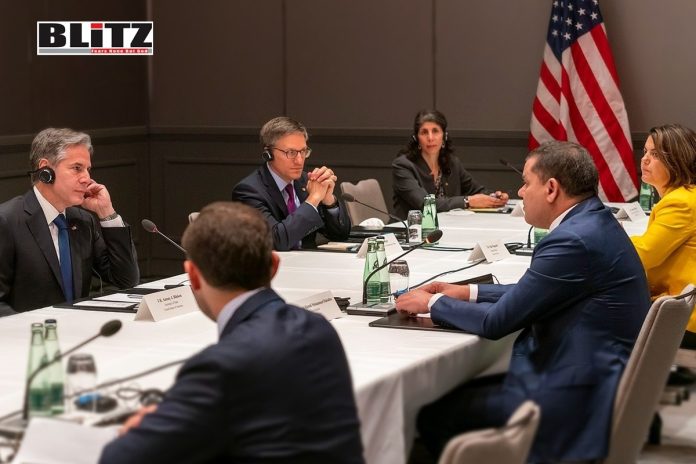In the complex mosaic of Libya’s political and security landscape, the rise of hybrid armed groups as quasi-state actors presents a daunting obstacle to the nation’s quest for stability, security, and sovereignty. These groups, intricately woven into the fabric of Libya’s remaining functional institutions, have fostered governance models that prioritize personal gain over societal well-being, hindering progress towards a cohesive and prosperous state. The convergence of political elites, illicit financial systems, transnational criminal networks, and heavily armed factions, often backed by foreign entities, has created a tangled web of power dynamics that perpetuate instability and impede the realization of a brighter future for Libya.
Amidst this backdrop, the cautious reentry of the United States onto the Libyan stage, epitomized by the appointment of a new ambassador, offers a glimmer of hope. Yet, it comes amidst a backdrop of past missteps and failed interventions, including ill-advised engagements with unsavory characters in the aftermath of Muammar Qaddafi’s demise. The recent reduction of US personnel in Niger and reports of heightened Russian involvement in eastern Libya underscore the urgency for a recalibrated American diplomatic approach.
In order to effectively confront the growing influence of external actors and address security challenges in the region, the United States must implement a multifaceted approach. Instead of continuing past practices that inadvertently bolstered militia groups, Washington must shift its focus towards prioritizing the reconstruction of Libya’s fractured state institutions. This entails a concerted effort to dismantle the entrenched political economies that sustain armed nonstate entities, thus fostering an environment conducive to inclusive governance. By undertaking these targeted initiatives, the US can lay the groundwork for a more stable and equitable future in Libya, mitigating the influence of external forces and empowering the Libyan people to chart their own course.
Central to this strategy is the advancement of transparent and fair financial systems aimed at disrupting the illicit funneling of oil revenues to armed factions. Concurrently, the United States should pave pathways for individuals tempted by militia affiliation to explore alternative opportunities, while concurrently nurturing inclusive political discourse to weaken the influence of hybrid actors. Initiatives focused on decentralization and strengthening local governance structures hold the potential to empower communities and curtail the resurgence of militia dominance. By undertaking these multifaceted efforts, a more resilient and inclusive foundation can be laid for sustainable peace and progress in Libya.
Moreover, the overhaul of Libya’s security sector stands as a cornerstone for fostering enduring stability. Previous methods, like train-and-equip initiatives, have fallen short in rectifying systemic challenges within the security framework. Thus, a comprehensive strategy akin to the Democratic Republic of the Congo’s proactive disarmament, demobilization, and reintegration paradigm becomes imperative. This approach not only anticipates forthcoming peace accords but also harmonizes with overarching national development goals, all while staying sensitive to the fluid sociopolitical landscape of Libya. Such a multifaceted strategy holds the key to laying a solid foundation for sustainable peace and prosperity in the nation.
Efforts at reform within Libya have frequently been superficial, primarily motivated by internal power dynamics rather than a comprehensive vision for restructuring the security sector. To achieve meaningful progress, it is imperative for the US and its Western allies to prioritize initiatives specifically tailored to Libya’s distinct context. This necessitates integrating security sector reform with transitional justice mechanisms and state-rebuilding endeavors. By taking a holistic approach that addresses the multifaceted challenges facing Libya, the international community can foster sustainable change and contribute to long-term stability in the region.
By embracing a forward-looking outlook and acknowledging the inherently political dimensions of their actions, the US and its allies possess the capacity to dismantle the hybrid groups deeply entrenched within Libya’s political and economic realms. Through deliberate and strategic engagement, they can effectively incentivize advancements towards national unity and socioeconomic development. In doing so, they hold the potential to mitigate political stalemates and facilitate the resurgence of Libyan sovereignty. This concerted effort represents a crucial step towards fostering stability and empowering the Libyan people to chart their own course towards a prosperous future.
Entering a renewed phase of US engagement in Libya necessitates a divergence from prior methodologies towards a nuanced and holistic approach. By tackling the underlying drivers of instability and actively bolstering Libya’s journey towards inclusive governance, the US stands poised to exert significant influence in sculpting a future characterized by stability and prosperity. Such efforts not only benefit Libya but also hold the potential to positively impact the broader regional landscape, fostering cooperation and resilience in the face of shared challenges.




